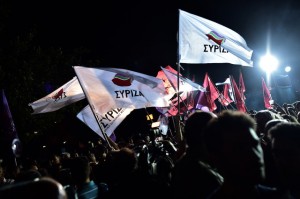Unpublished opinion polls during the summer indicated that Syriza was surging ahead. On 30th August the first official opinion poll for more than a month confirmed this trend.
The unadjusted (for those who won’t say, won’t vote, are undecided etc) give SYRIZA an 8.1% lead over the New Democracy, (25.8% to 17.7%), with Golden Dawn remaining 3rd holding on to c8.7%, PASOK and the recent “non-political” POTAMI collapsing, ANEL and KKE losing ground and DEMAR practically extinguished. However a further c16.5% are undecided or won’t say and another c13% intend to abstain or spoil their ballot.
Adjusted (for excluding all those), the SYRIZA lead is a record 11.5% and the figures are:
The radical Left SYRIZA = 36.6%, the Conservative New Democracy = 25.1%, the Fascist Golden Dawn = 12.3%, the Social Democratic PASOK/ELIA = 4.3%, the moderate conservative but anti-austerity ANEL (Independent Greeks) = 3.5%, the hardline Communist KKE = 5%, the “non-political” POTAMI = 3.3%, the eurocommunist DEMAR = 1% and Others (some 20 odd Green, Ecology, Trotskyite, extreme Right Wing and other odd/colourful groups) = 8.9%.
This represents a huge swing to SYRIZA and also a massive increase in support for the anti-austerity parties in general.
(b) Possible early elections:
There is a real possibility that there will be, after all, early elections in Greece (as early as late Autumn). Whilst the coalition government could stay in power for another year, it faces a crisis. The term for the current President of the State is expiring in the spring and unless the parliament elects a new one (for which it needs someone to get the support of at least 180 MPs, (out of the 300), there would have to be new elections. At the moment the ruling coalition (ND and PASOK) has only 153 votes and most of the opposition parties (SYRIZA, KKE, ANEL, GD and half of DEMAR) have stated that they will not support anyone, before new elections. The government, desperate to avoid elections at this stage, is frantically trying to woo various independent MPs (mostly defectors from the governing coalition parties, and from ANEL and DEMAR) in order to get the extra 27 votes needed. It is by no means certain (indeed it is rather unlikely) that they will succeed.
(c) The court case against Golden Dawn:
As widely reported, a few months ago following the international outcry against the brutal murder of an anti-fascist rapper by Golden Dawn thugs, Greece’s public prosecution service started proceedings against the leaders of Golden Dawn, on the basis that they are running a criminal organisation (having gathered evidence of paramilitary operations, secret training of armed gangs, caches of weapons and numerous organised incidents of violence and intimidation linked to the party etc); most of the Golden Dawn leaders have been imprisoned pending trial and apparently a massive dossier of evidence against them and the party has been prepared. However, it has come to light recently that the government is preparing to let them off the hook, by changing retrospectively the law under which they are being prosecuted. The change proposed (by a supposedly independent “criminal law review panel”) is to retrospectively restrict the ambit of the law against criminal organisations to only those whose purpose can be demonstrated to be financial gain; this would automatically wipe out the basis on which the Golden Dawn leadership has been prosecuted.
(d) Popular resistance to savage cuts and “fire sale” privatisations continues
Despite some indications of “demonstration fatigue” amongst some of the activists, the popular resistance to the savage cuts and “fire-sale” privatisations that the coalition government is trying to impose (often in breach of constitutional and other requirements) as demanded by the Troika is growing and it is often succeeding in frustrating various measures.
In some cases the anti-austerity forces are finding an unlikely ally in the constitutional courts. The judges, having first found unconstitutional some of the austerity measures imposed on the … judiciary, followed that up with similar judgements about the “uniformed services” (army, police etc) and more recently the famous “cleaners”. (Please remember that the final judgement of the Appeal court on the constitutionality of the sacking of the 585 cleaners, is set for the 23rd of September and that we have a crucial demonstration here in London on the 20th – details here).
A key initiative that has been frustrated by a combination of campaigning and court decisions is the proposed privatisation of the water authorities of big cities, announced by the government more than a year ago.
There has been a massive popular campaign against the proposals, which amongst other things has included a decision by local authorities in the region around Thessaloniki to hold a public referendum on the issue, to coincide with the May European and local elections (ie to issue voters with a 3rd ballot paper, asking them to vote on whether they agree or disagree with the government’s privatisation proposals). Despite the government’s efforts to prevent the referendum taking place (on the basis that it represented an abuse of the electoral process!!) the referendum took place successfully. The outcome was spectacular, beyond the expectations of even the anti-austerity forces, ie a staggering 98% voted against the proposals. This, together with a parallel judgement by the constitutional court querying the legality of some of the processes involved, has forced the government into a kind of temporary retreat. Of course the fight continues.
Update from the pen of Isidoros Diakides, GSC co-chair.



Pingback: Η αλληλεγγύη σας μας δίνει δύναμη. « Αγωνιζόμενες Καθαρίστριες